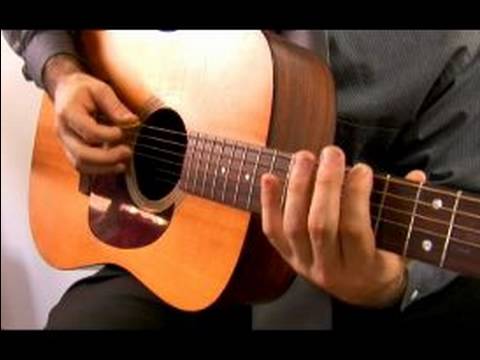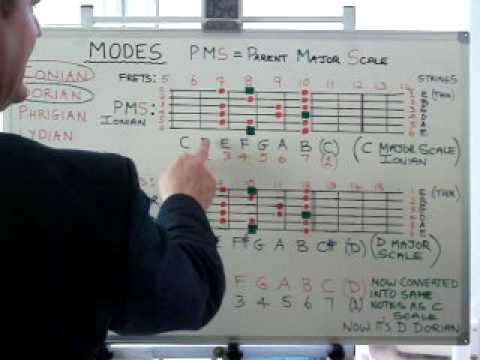www.creativeguitarstudio.com Andrew Wasson of Creative Guitar Studio answers a viewers question… Q: I would like to know how to improvise more melodically over a chord progression in any key; being aware of the scales and mode positions for the shapes along the length of the neck that one can use to solo over a specific chord. And, how to pick out the chord tones and strong notes – ie resolving a lick/riff to the root and including the chord notes, etc… Also, some advice on practicing the scales/modes around chord progressions would also be ideal. – Ashley Smith — England A: There is no doubt that Practicing scales and modes is certainly vital for developing a strong ability to solo melodically. However, there are many players like you that are finding difficulty with developing this skill. The key to tapping your full potential in this department will have to be the mastery of several concepts… 1). Practicing scales with a goal in mind of stretching your skills with them. In other words, never get stuck into a rut of constantly practicing scales day-in / day-out in the exact same way. 2). Learning other players; lines, guitar licks and phrasing styles. [...]
You may also like
Introduction To Guitar Modes – Guitar Lesson
Added by Admin 11 years ago
915 Views1 Comments0 Likes
Get instant access to FREE guitar lessons at GuitarLessons.com . Learn how to play the 7 guitar modes in these guitar lessons! This section will run through all seven guitar modes and show a...
Modes & Guitar Solo Techniques: Music Lessons : Playing the Seven Guitar Modes in E Major
Added by Admin 11 years ago
663 Views0 Comments0 Likes
Learn how to play the seven 7 musical guitar modes in the key of E major in this free music lesson on video. Expert: Casey Cormier Bio: Casey Cormier has been playing both the guitar and bass for 10 years. Filmmak...
What Are Modes, How Are They Made, And Why? Easy Lesson Explaining A Complex Subject
Added by Admin 11 years ago
4.50K Views25 Comments0 Likes
What Are Modes, How Are They Made, And Why? Easy Lesson Explaining A Complex Subject. The subject of Modes can drive fear into the most seasoned of Guitarists & musicians but, it need not be...
German Schauss Guitar Quick Tip – “Using Modes on Guitar”
Added by Admin 11 years ago
1.06K Views1 Comments0 Likes
LAMA Guitar Instructor German Schauss discusses using different modes on guitar. www.lama.edu Video Rating: 4 / 5









tony macalpine is a musician wizard
Thank qqqq very much ( I will call teacher)
yep man steve vai is amazing!!!!!!!!!!!
Using those diatonic intervals is ESSENTIAL, because it starts to free you up, you can jump around the scale more and hear the melodies. I do 3rd, 4ths, 5ths, 6ths etc. as well as triads. Great lesson!
starting a 7:20 is there a way u could send me a tab layout of this
where can I get a track beat like your?
techniquesforguitar (dot) com is a pretty decent website with tons of free info and free guitar lessons. check it out.
atonal is good
there is no scales, just chromatic, scales destroys the mind
Awesome video. Thanks for taking the time to post.
I’ve been practicing for almost a year now and my teacher didn’t teach me nun of this. All he does is give me a book and tell me to play some marry had a little lamb type of stuff. He doesn’t teach me no sort of techniques to improve my finger strength and speed. I learn more here than from him.
Hey, Thanks for the kind word… Much appreciate it! – Andrew
Thanks for your extremely informative videos. I devour the information you provide and appreciate it! I love learning the theory as well as getting tips on how/what to practice. THANK YOU!
I personally recommend you to google Justin Sandercoe (Justin Guitar) He is an amazing teacher of the basics! I think that Andrew (also an amazing teacher) teaches more advance stuff, so maybe you want to come back here later on your learning! Hope that helps you! Sorry for the bad english!
You are welcome, glad I could help!
That will help me too. Thanks.
I find melodies when soloing a lot better when trying different tunings
Great suggestion, having a guitarist map out a guitar neck on paper (and make a 100 copies) and write in the notes on each fret to memorize..
This familiarizes the name of each note in making a chord, pentatonic or mode scale. By marking the fret/notes with a highlighter pen, I would map out a particular run on the neck, even label my bends, Maping it out would engrain it in my memory.so much better.
Also, I reference each note of a chord to help vocalists find their harmony lines – in practice.
i think its great to do both. i’d strongly encourage the music theory side, which would be memorizing the notes and formula that make up the scale, because that way you actually understand the scale and its not just some foreign group of notes to you. however, to apply it to your guitar playing, i would then move on to becoming familiar with certain scale shapes over the board, 1.) so you can play the scale everywhere and 2.) so you then know where the notes are on the board. hope this helps!
Do you have lessons for absolute beginners? And just so you know I am a very slow learner.
a very deeply informative video!
I have the same guitar that is awesome.
No problem, glad to help. I started this journey not long ago and still consider myself a music theory peon, but learning what you have been doing all these years it is worth it and actually interesting. Learning the notes on the fretboard by heart and intervals alone will surprise you. Andrew is great, also check out Rob Chapman, Wallimann, and Theodore Ziras. If you are interested in learning about reading music, right from the basics check out YT account name Lypur. Good luck!
In highschool i was lucky we had a jazz guitar teacher, who did not play (commercial music) or the same thing twice within a song (jazz) Basic open chords were boring bob seger songs john couger mellon camping all burnout Slosh wasnt around yet, My friends and i would bring him our favorite records(1983-84) rush,old scorpians uli, yngwie in Alcatraz, steve vai, he didnt like em, until we told him steve vai played in zappa, he changed, He reserved ‘genius’ for Steely dan aja? playfasteronly